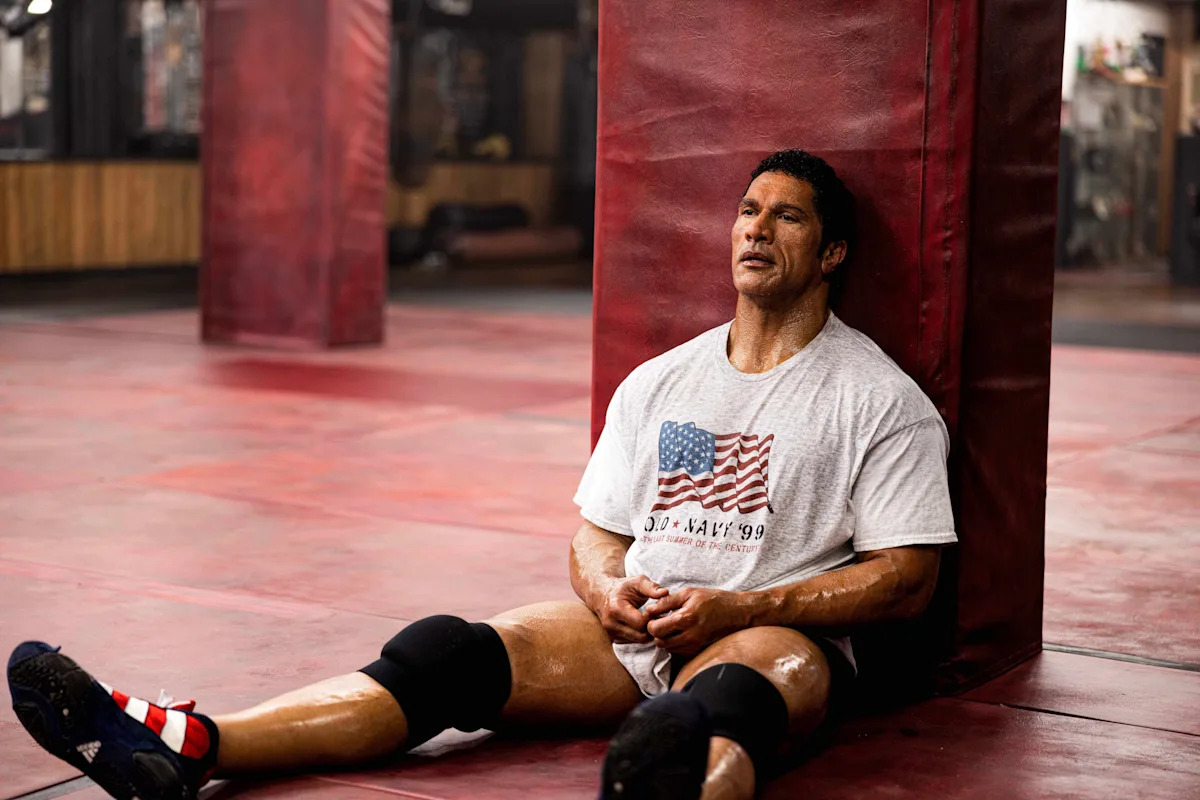The Smashing Machine is a frustrating movie. Occasionally kind of brilliant and an undeniable actor’s showcase, but ultimately very frustrating.
I want to focus on the good first, and the acting in this movie is frequently quite good. If you go to the cinema to see stars fully inhabit other people, this is the flick for you.
Dwayne Johnson, who stars as MMA fighter Mark Kerr making the rounds on the Pride fighting circuit in the late 1990s, has clearly gotten tired of being dismissed as a generic action lunkhead. His bulk is a misdirection here, one that distracts from the quiet, calm, almost wheedling that emanates from his bourbon-barrel-sized chest. He’s dolled up in prosthetics that render him almost unrecognizable, at least until he shaves his head and turns just the right way and the light hits him just right and you’re like “Oh yeah, that’s the Rock.” Not Dwayne Johnson: the Rock, the WWE superstar, a man the size of a tank with traps that could tear down a temple. Ultimately, you can’t fake muscles, and there are only a handful of people in the world who could play this role.
Johnson plays Kerr with a childlike sensibility here: Benny Safdie’s script has him constantly complaining about his girlfriend, Dawn (Emily Blunt), not being “nice” to him, how she’s “rude.” There’s a wheedling tone to his voice, a whininess that undercuts his enormous girth, and that incongruity plays throughout the film; in an opening voiceover, as we see Kerr dismantle a series of opponents with headbutts and eye gouges, we hear that same tone of juvenile wonder at his own brutality.
Blunt’s work as Dawn Staples is trickier: She’s a fundamentally unlikable character in that she’s not quite a nag or a harpy, but she is clearly unintentionally destructive to Kerr’s career and not particularly thoughtful about his personal needs. With a wardrobe pulled from the closet of Sopranos moll Adriana La Cerva, Blunt walks a fine line between supportive, oblivious, annoying, and self-destructive.
Give the gift of Sonny: Pop this review into a friend’s inbox or post it to social media:
There’s a scene late in the film set to Bruce Springsteen’s “Jungleland”—diegetic at first as background music in their shared home, then soaringly nondiegetic as things come to a head and Roy Bittan’s thunderous organ sends us out—that is either the best scene of the year or the most self-parodic, a lover’s quarrel that turns heated then ugly then potentially deadly. I’m biased here (“Jungleland” is, maybe, my favorite song), but there’s something perfectly overwhelming about that track’s booming wall of sound scoring the moment that Dawn and Mark’s life comes tumbling down.
It’s a genius musical cue by Safdie, who directed The Smashing Machine in addition to writing, and it’s the best sequence in the movie. But something about the film as a whole never quite gelled for me: It’s a series of great sequences that left me a little cold. Safdie doesn’t hew tightly to formula—I can’t think of another fighting movie that ends this way—but The Smashing Machine still feels relatively generic, walking us through the familiar beats of a legend-in-the-making who succumbs to drugs and relationship demons only to attempt a return to glory.

Not to wear my philistine badge too proudly, but my problem with The Smashing Machine may be that it needed to be a bit more formulaic. Formulas are good; formulas work; that’s why they’re formulas. And Kerr exists on the periphery of one such formulaic story: Kerr’s training partner and good friend Mark Coleman (played by Ryan Bader, a UFC fighter who is making his big-screen debut here in a deeply charming supporting performance) is in the same series of tournaments. He’s constantly on the periphery of the film, working hard, juggling family and health, fighting Father Time in addition to the meatheads in the ring.
A more formulaic sports movie has Coleman at the center of it, with Kerr his fuckup, cautionary-tale friend. And while there’s something intellectually pleasing about making a sports movie about a character who should be on the film’s periphery and putting him at the center of it—subverting all our expectations about who will win and how, etc.—it’s still emotionally unsatisfying.
